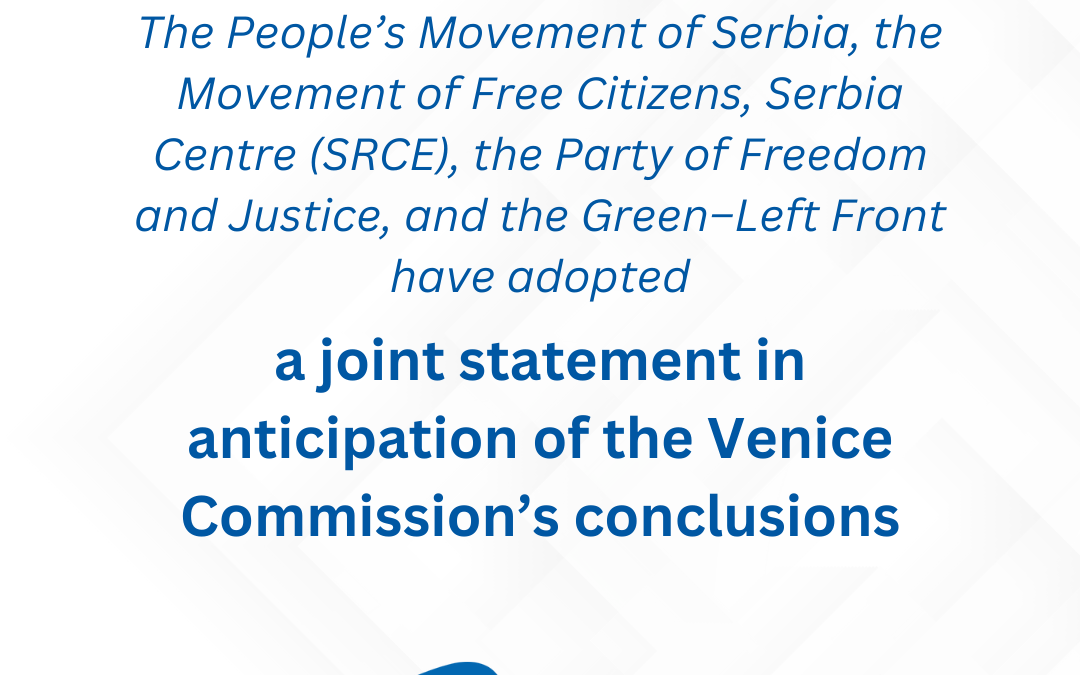
When EU officials visit Serbia, we usually witness a familiar sequence: a round of smiles, a round of vague statements, and a round of press releases that few actually read. But the visit of Marta Kos to Serbia on 29-30 April 2025 was not just another date in the bureaucratic calendar of Brussels. A former entrepreneur, ambassador, government official, and presidential candidate — now EU Commissioner for Enlargement — came to Serbia not just to observe, but to listen, and to communicate. And that she did, setting herself apart from other EU officials by not speaking only to the authorities, but directly to the citizens.
Her message was clear: Europe cannot have a blind eye to what is happening in Serbia. Protests, students, suffocation of freedoms — all of it is visible in Brussels. And the EU is not (or should not be) just a single market — but a community of values. As long as there are citizens defending those values, Europe must not abandon them. Her tone was neither accusatory nor flattering. It was simply: European. A tone that affirms human rights as undeniable, and institutions must do their work — even when this is inconvenient to those in power.
Meeting with students who walked hudreds of kilometers across Serbia, biked to Strasbourg, and are now running a relay to Brussels was a meeting with the real future of the country. Not a romanticized one, but a tangible one. These young people are not asking for privileges, but for rules. Not for sympathy, but for trust. And in speaking directly to them, Marta Kos came across as one of those rare EU voices who understand that ordinary citizens often comprehend Europe better than those who run it.
She also visited Novi Sad to pay tribute to the victims of the November 1, 2024 tragedy at the train station, caused by the collapse of the station’s canopy. It was not just a protocol gesture – but a sign that Europe sees the grief of the people, and that rebuilding of trust starts with human gestures, not just formal ones. She met with civil society, the opposition, and the government. The meetings were rich in both meaning and substance.
At the end of her visit, she also received a delegation of students aligned with the ruling authorities – those who label their fellow students’ and citizens’ call for the rule of law as an act of destabilization. Some interpreted that meeting as a mistake, some as a defiant message, and others as an attempt to avoid being one-sided. Perhaps she wanted to show that Europe does not exclude — even when it disagrees. Whether she succeeded remains open to interpretation.
What is not in question, however, is how she spoke. She did not shy away from difficult topics, nor she went into hiding behind typical Brussels’ bureaucratic language. She spoke clearly: about institutions that must function. About rights that must not depend on political will. About Serbia that still can become truly European — if it chooses to place its fundamental values above other interests.
Even with one moment that imposed a shadow – a meeting that clouded the overall narrative – the broader picture remained intact. The focus remained on truth, values, and a generation no longer willing to settle for false compromises. Europe has, on that day, resembled its better self – the one that asks, listens, and communicates openly.
Without much sugarcoating, Kos made her message clear: time is running out. Serbia’s EU path is no longer a symbolic question — it is a matter of democratic survival. Will this visit change anything? Perhaps not immediately. But just as a bicycle does not move on its own — someone has to pedal – Serbia’s European path will not move from a standstill until we get out of the comfort zone of political cynicism and low expectations. There is no time left for hedging – either we accelerate and genuinely move towards the EU, or we keep simulating integrations and stay behind currently fast-moving Albania and Montenegro until Brussels closes the door. And everything else along with it.
Europe is not perfect. But it remains the space where we can breathe as free citizens. And even if there are those within the EU who try to smuggle in the wrong values, that does not mean we should let them take root here too. Quite the opposite – it is one more reason to be consistent, and brave enough to treat European integration not as a box-checking process, but as a real commitment and direction.
If there is one lasting message from this visit, it is the need to be wiser, clearer, and more principled in defending the fundamental values. Because those values are exactly why students and citizens are marching the streets of Serbia today.
Authored article and viewpoint by: Dragana Djurica, Secretary General of the European Movement in Serbia
Photo credit by EU Delegation in Serbia



